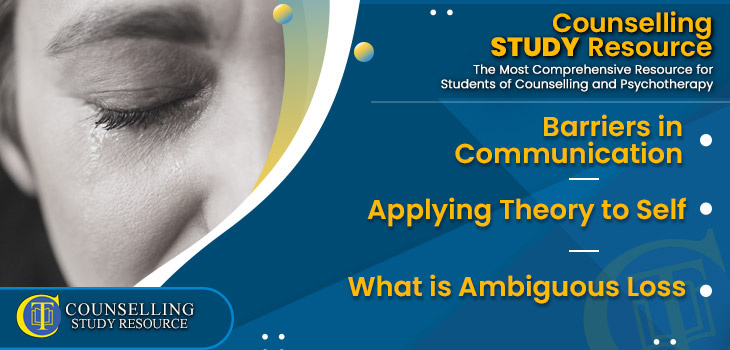204 - What is Ambiguous Loss
Barriers in Communication - Applying Theory to Self
In Episode 204 of the Counselling Tutor Podcast, Rory Lees-Oakes and Ken Kelly return with three new topics of discussion:
- In today’s ‘Counselling Foundations’ we look at barriers in communication.
- Then in ‘Focus on Self’, Rory and Ken discuss applying theories to self.
- And finally in ‘Practice Matters’, Rory and Chloe Swinton discuss what is ambiguous loss.
Barriers in Communication [starts at 1:40 mins]
Counselling is all about communication, but sometimes there are certain things that can get in the way such as simply not listening or not knowing how to respond.
In this section, Rory and Ken take us through the different types of barriers in communication, and how they’re caused:
- External barriers such as environmental disruption e.g. roadworks, background noise.
- Internal barriers such as hearing difficulties - thinking about whether your client knows what you’re saying, or if they are able to lip-read.
- Cultural barriers, class barriers, barriers in terms of technology.
- Is there a topic you find difficult to discuss or something that makes you uncomfortable?
- How the use of jargon and abbreviations can leave a member of the conversation feeling lost or misunderstood.
- Barriers can come from both the speaker and the listener – be aware of this and recognise when a barrier occurs and be sure to find a way to deal with it.
A free handout on 'Barriers to Communication Cheat Sheet' is available to download in the green button above.
Applying Theory to Self [starts at 26:47 mins]
Knowing certain theories is incredibly important as a counsellor, but it’s even more important to be able to apply these theories. This week, Rory and Ken share how applying these theories to yourself can solidify your understanding:
- Allows you to have a better understanding of yourself.
- Gives opportunity for personal development and growth.
- By helping yourself, you can help others – developing empathy.
- How it can be the final step in helping you to fully understand the theory.
What is Ambiguous Loss: An Introduction for Counsellors [starts at 43:39 mins]
This week Rory spoke with Chloe Swinton about what is ambiguous loss, something that everybody experiences at some point in their life, but not many people are aware of.
In this discussion, the main points explored include:
- The two types of ambiguous loss:
- Psychological absence with physical presence e.g. dementia.
- Physical absence with psychological presence e.g. missing people, divorce.
- Ambiguous loss is stressful loss.
- Can be caused by a lack of closure.
- Can appear when you have been prevented from grieving, or saying goodbye.
- Caused by external issues.
- People dealing with ambiguous loss may isolate themselves, not accept their loss, etc.
Counsellor CPD members can watch Chloe's lecture on ambiguous loss here.


